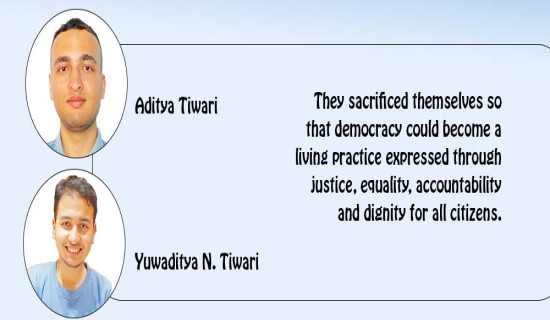- Friday, 30 January 2026
Public Health In Policy Focus
Dr. Shyam P Lohani
Nepal’s unique yet difficult terrain has always been challenging for an effective implementation of health service delivery. An estimated 10 per cent of the total budget is necessary to provide quality essential health services to all citizens. There are several challenges that exist in the health sector such as a rapid increase in the non-communicable diseases among the population, burden of climate change-related diseases, low level of availability of health manpower in remote areas, low socioeconomic and educational status besides poor infrastructure, and lack of necessary equipment.
The Constitution of Nepal, 2015 has made health a fundamental right of the people. This provision has ensured political thrust to expedite efforts to ensure universal health coverage (UHC). Now, it is the duty of all levels of the federal structure to ensure the fundamental rights of the people. The collective efforts of all three levels of government are, thus, critical in this endeavour. In the last year, the present government has continued the good efforts of the past governments and initiated new endeavours to better health service delivery.
Issues
Our world has become a confusing place since the coronavirus was declared a pandemic by the World Health Organisation (WHO). Due to the coronavirus pandemic, our lifestyle has changed drastically. Suddenly, we are in an awkward situation where we can simply wish to have our old life back. In the last couple of decades, this is the only time when most people around the globe are worried about the same thing at the same time. The response to the pandemic has been different in various countries with mixed results in containing the spread of the disease. It has resulted in a change in our normal traditions, disrupted our daily activities, and claimed hundreds of thousands of lives.
Researchers throughout the world have warned that there might be a suicide tide to ensue during a pandemic and more importantly, after this public health emergency. The COVID-19 pandemic has brought several alarming risk factors such as social isolation, anxiety and depression, inadequate treatment availability, and poor seasonal timing (JAMA Psychiatry, 2020). There is evidence that during the 1918-19 influenza pandemic, there was an increase in the number of suicide deaths in the USA (Wasserman, 1992) and among Hong Kong elders during the severe acute respiratory syndrome (SARS) epidemic in 2003 (Cheung et al, 2008).
In terms of vaccination coverage, 65.8 per cent of the world population has received at least one dose of a COVID-19 vaccine. A total of 11.8 billion doses have been administered globally, and 6.48 million are now administered each day. Only 16.2 per cent of people in low-income countries have received one dose (Our World in Data, 2022). The total number of people who received the first dose of COVID-19 vaccines in Nepal stands at 96 per cent out of which 85 per cent received full vaccination. About 38 per cent also received a booster dose (MoH, 2022). However, Our World in Data reports Nepal has covered vaccination among 75.35 per cent of its population as of May 25, 2022.
The COVID-19 pandemic demanded focused priority on vaccination campaigns in the last two years. However, the government continued to implement routine health programmes and provision of health services. The majority of activities carried out last year were a continuation of the programmes initiated in the past but the increased focus was on the COVID-19 treatment and vaccination of its citizen. The government has given emphasis on strengthening the facilities of the existing hospitals and establishing new health facilities at the local level over the last year.
The government has decided to make the universities a centre of excellence. It has decided to make it a Centre for providing specialised education to attract foreign students. It has further committed to initiating the establishment of two medical institutes/colleges in each province. With the affiliation from a Far Western University, it will initiate the establishment of a medical college in Dadeldhura. The government also decided to increase the number of seats in the college as per their capacity.
The government decided to implement digital health programmes. It aims to digitalise health records in every hospital. The provision of the legal protection of health institutions and workers has been envisioned. The establishment of a social unit in a health institution is to be started in order to provide service delivery from one door. Similarly, it has decided to start COVID-19 vaccination for 5-11 years old as soon as possible.
The provision of specialised care for senior citizens has been made and public health programmes for the prevention and control of non-communicable disease is to be prioritised. It has also made provision for every citizen of 40 years old to have a free health check-up at the local level every year. Health Insurance Act has also been enacted which ensures a legal basis for covering the entire country under the umbrella of health insurance.
Vaccine against uterine cancer
The government has made provisions for the screening for uterine cancer and vaccine for uterine cancer in young girls. It has also committed to initiating programmes for the screening and treatment of breast cancer. The government has decided to start a blood bank in all provinces in cooperation with the provincial government. The strengthening of the central public health laboratory has been prioritised in order to make available all specialised tests within the country. It has also decided to expand services of the existing national organ transplantation center. The government has decided to encourage the establishment of laboratories by the private sector.
The government has given due priority to containing and treating non-communicable diseases with multidisciplinary programmes. The provision of the establishment of rehabilitation centres for differently able people, people with mental illness as well as for people with chronic illnesses such as cancer is a good initiation. The country-wide health awareness programme for non-communicable diseases has been given due priority. Therefore, in the conclusion, the endeavours of the government for the improvement of existing health infrastructures and delivery, initiation of new programmes, and promulgation of new policies in the health sector are satisfactory.
(Prof. Lohani is a founder and academic director at Nobel College. lohanis@gmail.com)

















